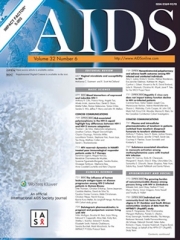Posted on September 07, 2021
Source: AIDS

"Depression and HIV viral nonsuppression among people engaged in HIV care in an urban clinic, 2014–2019"
Lesko, Catherine R.a; Hutton, Heidi E.b; Fojo, Anthony T.c; Shen, Nicola M.a; Moore, Richard D.c; Chander, Geetanjalic
Author Information
aDepartment of Epidemiology, Johns Hopkins Bloomberg School of Public Health, Baltimore
bDepartment of Psychiatry and Behavioral Services, and
cDepartment of General Internal Medicine, Johns Hopkins University School of Medicine, Baltimore, Maryland, USA.
Abstract
"Objective:
The aim of this study was to describe the risk of viral nonsuppression across the depression care cascade.
Design:
A clinical cohort study.
Methods:
We used depressive symptoms (PHQ-8 ≥ 10) self-reported on computer-assisted surveys, clinical diagnoses of depression in the medical record in the prior year and pharmacologic (any prescription for an antidepressant) and psychologic treatments for depression (attendance at at least two mental health visits in the prior year) to classify patients into groups: no history of depression; prior depression diagnosis; current indication for depression treatment (symptoms or clinical diagnosis); and treated depression (stratified by presence of persistent symptoms). We associated position in the depression care cascade with viral nonsuppression (>200 copies/ml) 7 days before to 6 months after the index self-report of depressive symptoms.
Results:
History of depression [adjusted risk difference (aRD) relative to no history = 5.9%, 95% confidence interval (95% CI): 1.5–10.3] and current depression (symptoms or diagnosis) in the absence of treatment (aRD relative to no current depression or depression treatment = 4.8%, 95% CI: 1.8–7.8) were associated with a higher risk of viral nonsuppression than no history of depression. Depression treatment mitigated this association (aRD = −0.4%, 95% CI: −2.5 to 1.7).
Conclusion:
The relationship between depression care cascade and viral suppression is complex. Untreated depression and clinically unrecognized depressive symptoms were both related to viral nonsuppression. Treated depression was not associated with viral nonsuppression; however, a high proportion of treated patients still had depressive symptoms. Depression treatment should be titrated if patients’ symptoms are not responsive and patients with a history of depression should be monitored for ART adherence."